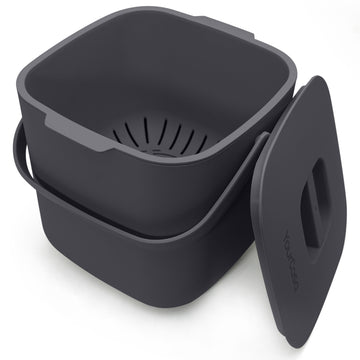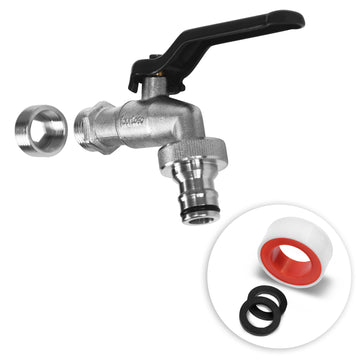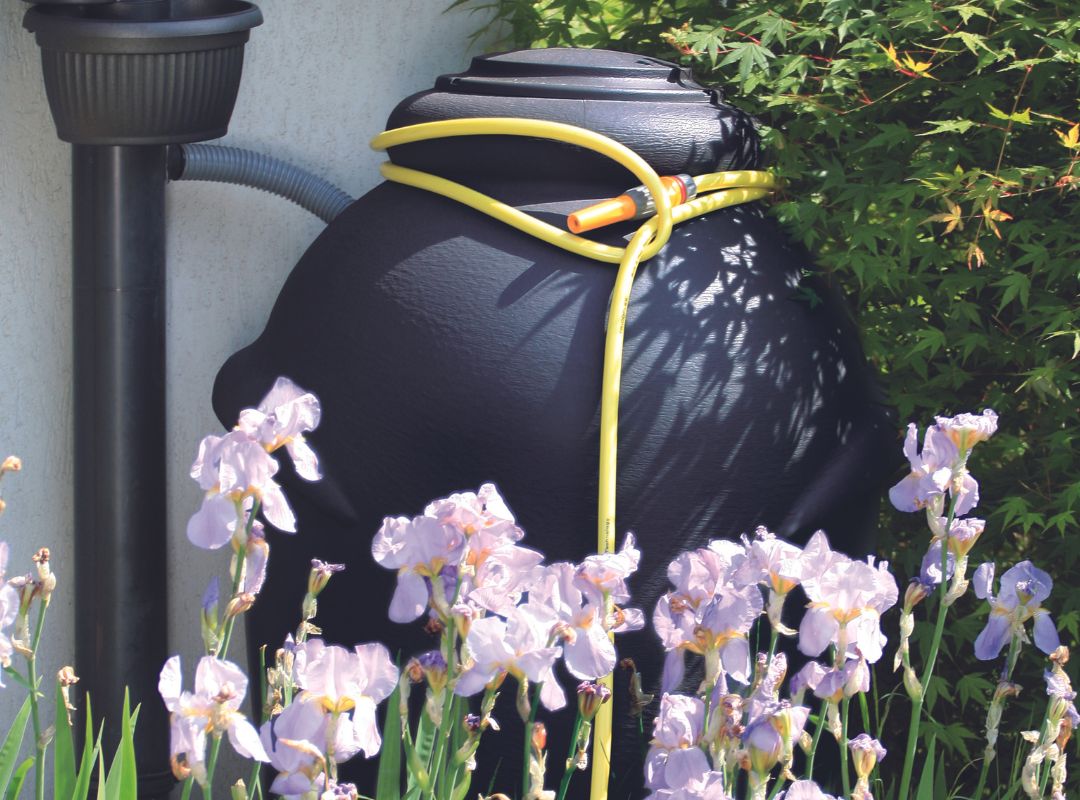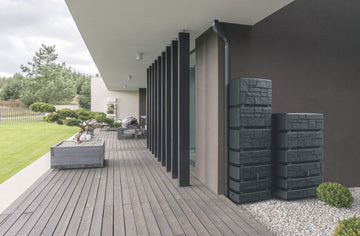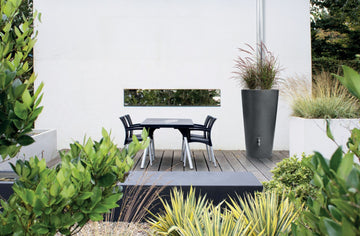Sustainable garden care in summer: economical watering and natural fertilization
by Robert Zielinski on Feb 27, 2024

If you want to use your green thumb in summer, it is even more important than in other seasons to pay attention to sustainable practices - after all, it is getting increasingly hotter and drier in Germany in summer too. It is not only our forests and meadows that feel the extreme dryness, but also your plants. In the warm months, wise use of water is therefore particularly important. By using collected rainwater and enriching the soil with natural compost, you can make a decisive contribution to protecting the environment, while at the same time offering your plants the best possible care.
How can you water economically and fertilize naturally in summer? To water economically in summer, collect rainwater in rain barrels and use drip irrigation systems. This allows you to deliver water directly to the roots and minimize evaporation. Water early in the morning or late in the evening when the sun is not as intense. For natural fertilization, mix homemade compost into the soil. Compost improves soil structure, promotes beneficial microorganisms and provides plants with essential nutrients. This eliminates the need for chemical fertilizers and leads to a healthy, sustainable garden.
In this article you will learn how to water sparingly and fertilize naturally even in the warm season.
Why rainwater and compost are essential in summer
Rainwater and compost are invaluable for any garden in summer. Rainwater is a soft, low-lime alternative to tap water . The lime contained in tap water can harm certain plants, including fruit and vegetable plants, and can make the soil in your garden unusable over time. Rainwater, on the other hand, is free of lime, chlorine and other chemicals that can be found in the municipal water supply system. Using it not only helps to reduce the consumption of precious drinking water, which is particularly important in summer, but also saves your wallet.
Compost, on the other hand, is an extraordinarily rich, natural fertilizer that enriches the soil in your garden with important nutrients and improves its structure. It promotes water retention in the soil, which is essential in the hot summer months to prevent drying out and keep your plants healthy. The use of compost also supports the ecosystem in the soil and promotes the formation of humus, which in the long term leads to stronger plants and richer harvests.
Instructions for effective irrigation with rainwater
A first step towards environmentally friendly and resource-efficient gardening is the use of rainwater - especially during periods of prolonged drought. By collecting rainwater in rain barrels or other collection systems, you can make optimal use of this natural resource to supply your plants during dry periods in summer. This method not only saves money by reducing your consumption of tap water, but also protects our environment - because the treatment and transport of water consume a lot of energy.
Irrigation plans and systems
If you want to use rainwater in your garden for efficient irrigation , a well-thought-out irrigation plan is essential. The right irrigation system is also important. Now you may be wondering what an irrigation plan actually is. In summer in particular, it is important that you adapt the watering of your plants to the time of day. If you water when the sun is at its highest and it is hottest, a large part of the precious rainwater evaporates before it even reaches the roots of your plants.
By adjusting the watering times to the needs of each plant and using smart watering systems such as drip hoses, you can apply water directly where it is needed - at the roots. This not only minimizes water loss through evaporation, but also allows you to reach deeper roots, making your plants more resistant to drought. Also pay attention to the weather conditions. If it rains, you should water less or not at all. If, on the other hand, the sun shines all the time, you should water more so that your plants do not dry out - but only after sunset. If you water in the blazing sun, your plants can be damaged. Finding the right time to water and achieving optimal watering is not that difficult.
Tips for reducing evaporation
Reducing evaporation on hot summer days is actually quite simple. It's best to water your garden in the early morning or late evening when temperatures are lower. Mulching is another effective strategy; a layer of organic material such as bark mulch or straw will hold moisture in the soil longer and reduce water evaporation. It also protects the soil from direct sunlight and keeps it cool, which further improves water retention.
| Tips | Summary |
| Adjust watering times | Water your plants in the early morning or late evening to minimize water loss through evaporation. |
| Use modern irrigation systems | Use drip hoses to deliver water directly to the roots of plants. Targeted irrigation increases efficiency and saves water. |
| Mulching | A layer of organic material such as bark mulch or straw on the soil helps retain moisture better, protects against sunlight and improves water retention. |
| Watering during the cooler times of the day | Water your plants when the sun is less intense to maximize water delivery efficiency and reduce evaporation. |
Composting: The natural way to fertilize
If you want to work sustainably and in an environmentally friendly way in your garden, there is no alternative to using compost. You can easily make it yourself - using a composter in which you can recycle organic kitchen and garden waste. Compost is a rich, nutrient-loaded fertilizer that naturally enriches the soil in your garden. A nice side effect: By composting yourself, you reduce the amount of waste in landfills and thus also their energy consumption.
Use of compost in summer
Using compost is particularly beneficial in summer, when your plants are growing fastest. Spread a thin layer of compost around your plants or work it lightly into the topsoil to improve nutrient supply and increase the soil's water-holding capacity.
Benefits for soil and plants
Compost helps to retain moisture in the soil , ensuring that your plants survive the drought stress of summer unscathed. If you regularly add compost to your soil, you will even promote life in your soil - worms, insects and microorganisms love it.
Compost also promotes soil aeration , which in turn strengthens the roots of your plants and promotes their growth.
Compost is also rich in microorganisms that help protect plants naturally from pests and diseases. Enriching the soil with compost also reduces soil erosion and promotes the sustainable health of the garden, making it an essential part of natural garden care.
In our table you can see all the benefits of using compost in your garden at a glance:
| Tips | Summary |
| Sustainability & Environmental Protection | Composting reduces waste in landfills and enriches the soil with nutrients by recycling organic kitchen and garden waste. |
| Application in summer | Spread a thin layer of compost around the plants or work it into the top layers of soil to provide nutrients and increase water retention. |
| Maintaining moisture | Compost helps retain moisture in the soil, which helps plants survive drought stress in summer. |
| Promoting soil life | Regular composting promotes healthy soil life, which is appreciated by worms, insects and microorganisms. |
| Strengthening plant roots | Compost improves soil aeration, which strengthens root development and promotes plant growth. |
| Natural plant protection & soil health | Rich in microorganisms, compost provides natural protection against pests and diseases and reduces soil erosion. |
Preventing water waste in the garden
By avoiding wasting water in your garden, you are doing your part to protect the environment worldwide . And not only that: you get a healthy, thriving garden for free.
By using conscious watering methods and utilizing technologies such as rainwater harvesting systems and efficient irrigation systems, you can significantly reduce your water consumption. The key principle is to use water in a targeted and needs-based manner, so that every drop goes exactly where it is needed most: directly to the roots of the plants. Incorporating mulch into garden beds also helps to retain moisture in the soil and minimize evaporation.
Summer highlights from the shop
In the YourCasa shop you will find everything you need to make your summer garden care more sustainable - from rain barrels to composters and all the necessary accessories.
Optimal rain barrels for the summer
At YourCasa you will find numerous rain barrel models for all requirements . For rainy regions there are large barrels with up to 800 liters such as the YourCasa rain barrel 800 liters [AquaGiant] XXL rain barrel square made of plastic . If a smaller version is enough for you, you can, for example, choose the stylish YourCasa rain barrel 210 liters [Aquaform] with metal thread and lid - rain barrel frost-proof made of plastic - rainwater barrel - rainwater tank garden or the practical YourCasa rain barrel 250 liters [TwinView] square and narrow - wall tank - rain barrel frost-proof made of plastic - rainwater barrel .
Installing rain barrels in your garden is pretty easy. Place the barrel under a downpipe that directs rain from your roof and gutter directly into the barrel. Saw the downpipe to the right height. Install a filter and overflow protection if necessary. And voilà: you can now collect rainwater in your garden.
Composter for the summer garden
Even though the composters from YourCasa are officially kitchen composters, you can still use them for your garden - or at least the compost material that is collected. The advantage of the small kitchen composters: you don't have to take your kitchen waste to the garden every time, but you can simply dispose of it in your kitchen and, when the bin is full, take the resulting compost to your garden to do something good for your plants. Exception: the new YourCasa Ecofusion for the garden.
Models that we regularly recommend are, for example, the YourCasa® compost bin - real wood - stainless steel - for everyday organic waste in the kitchen - dishwasher safe - removable insert - organic waste bin with lid Organic waste bin for the kitchen in an elegant real wood and stainless steel design that will brighten up any kitchen, or the large, seven-litre YourCasa® compost bin - 7L - for everyday organic waste in the kitchen - dishwasher safe - odor-tight - removable inner insert - organic waste bin with lid Organic waste bin for the kitchen , which you can easily empty and clean thanks to its removable inner insert.
As with the rain barrels, using the YourCasa compost bins correctly is not rocket science. Start by filling your compost bin with a loose layer that allows enough air to pass through - for example with small twigs or loose kitchen scraps. You can then layer so-called "green" and "brown" materials on top. Green materials are, for example, vegetable scraps, coffee grounds and fruit peels, brown materials are, for example, crushed eggshells, paper towels and chopped pieces of cardboard. The latter should predominate with a ratio of 3:1 to avoid bad smells.

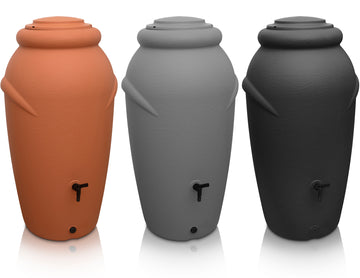
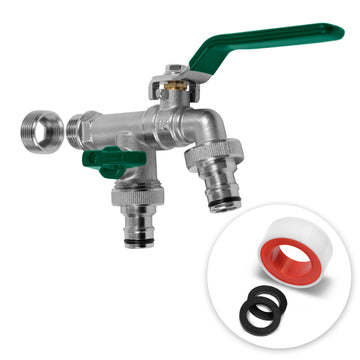
![Drei hohe YourCasa Regentonne 240 Liter [Wellen-Design] - Frostsicher & UV-beständige Gartentöpfe in den Farben Schwarz, Grau und Terrakotta, jeweils mit Drainagesystem für nachhaltige Bewässerung.](http://yourcasa.de/cdn/shop/files/ohnelogo_b8aeecac-557e-4106-a999-e77dcd160209.jpg?v=1707130230&width=360)
